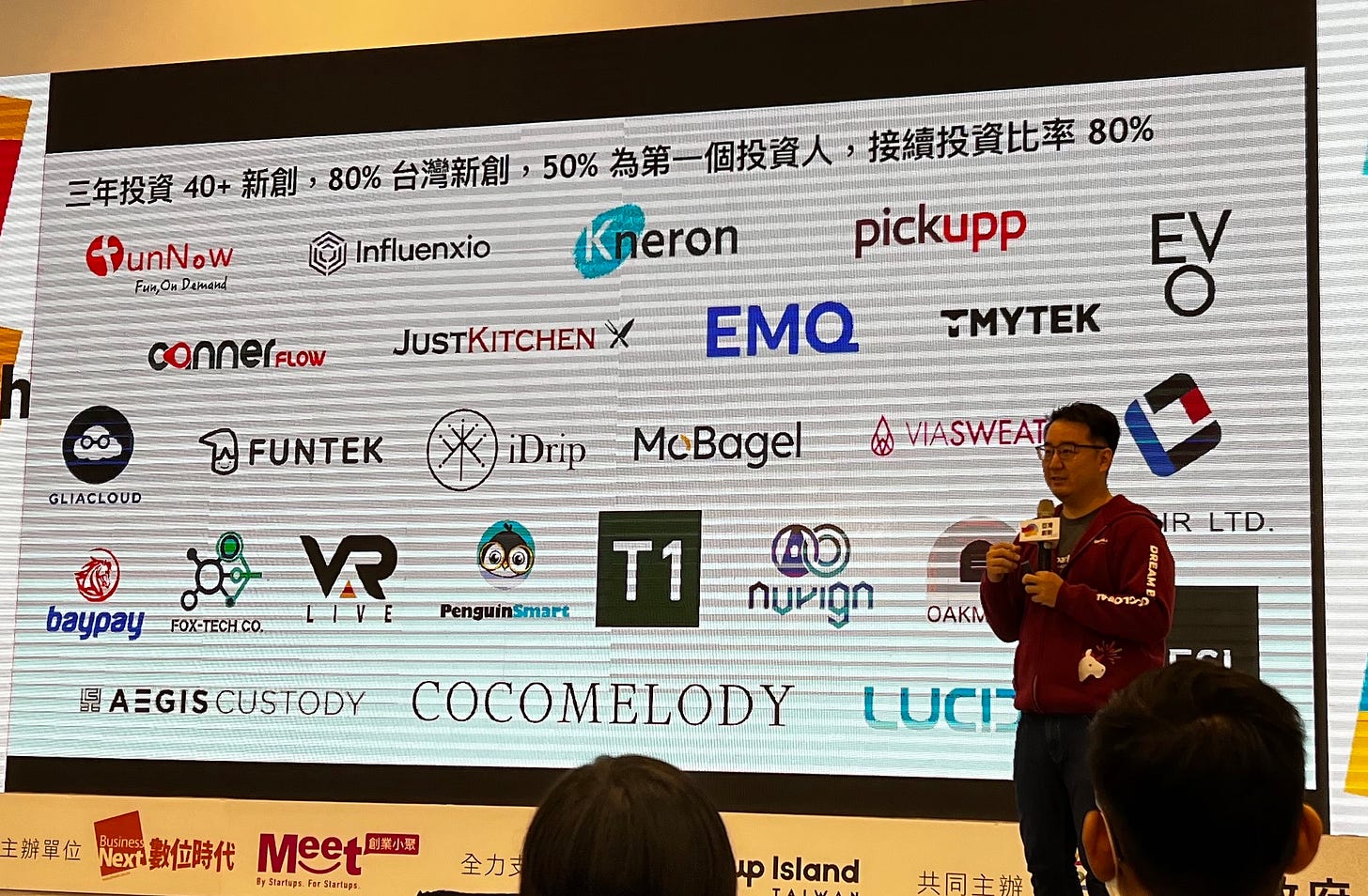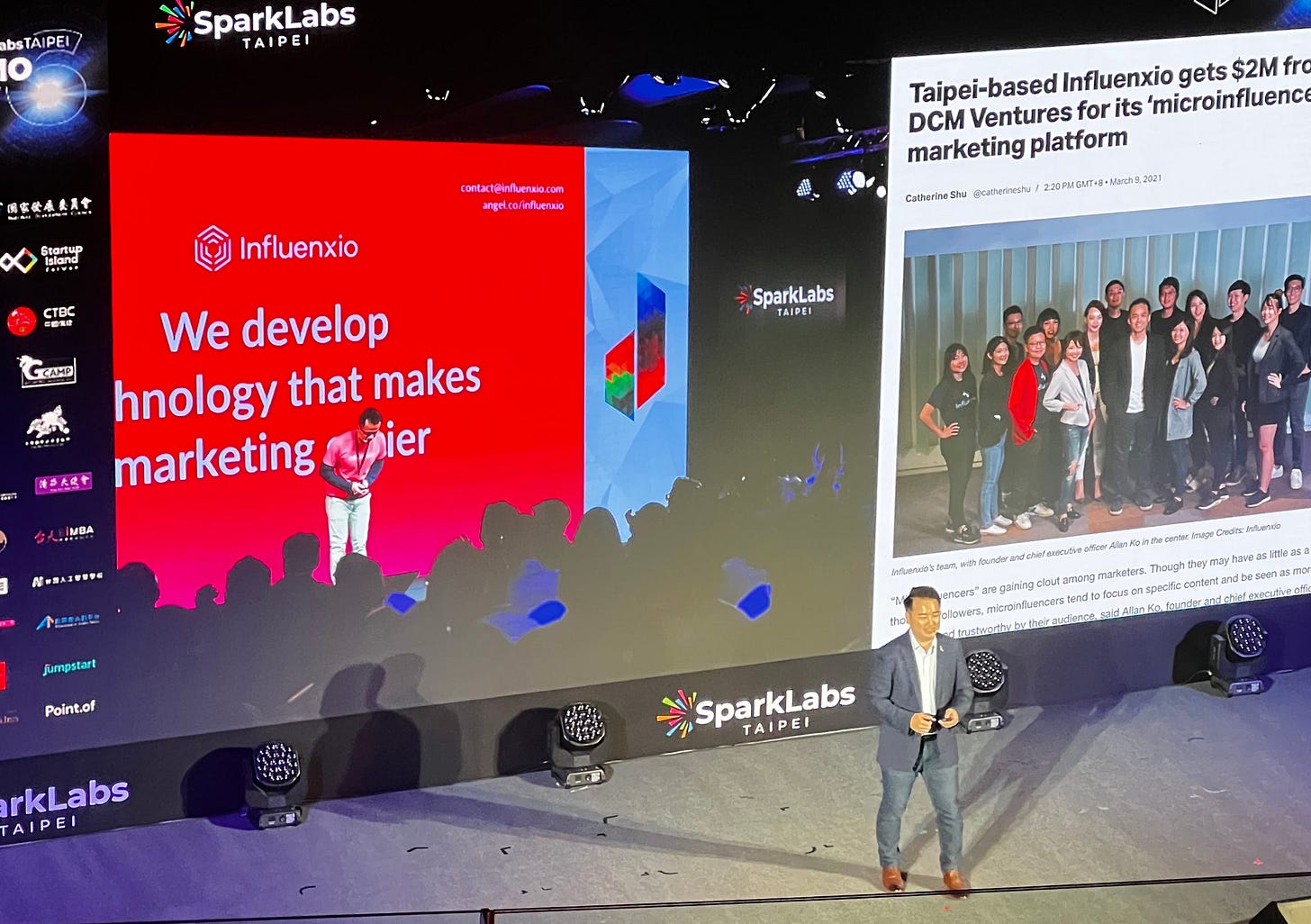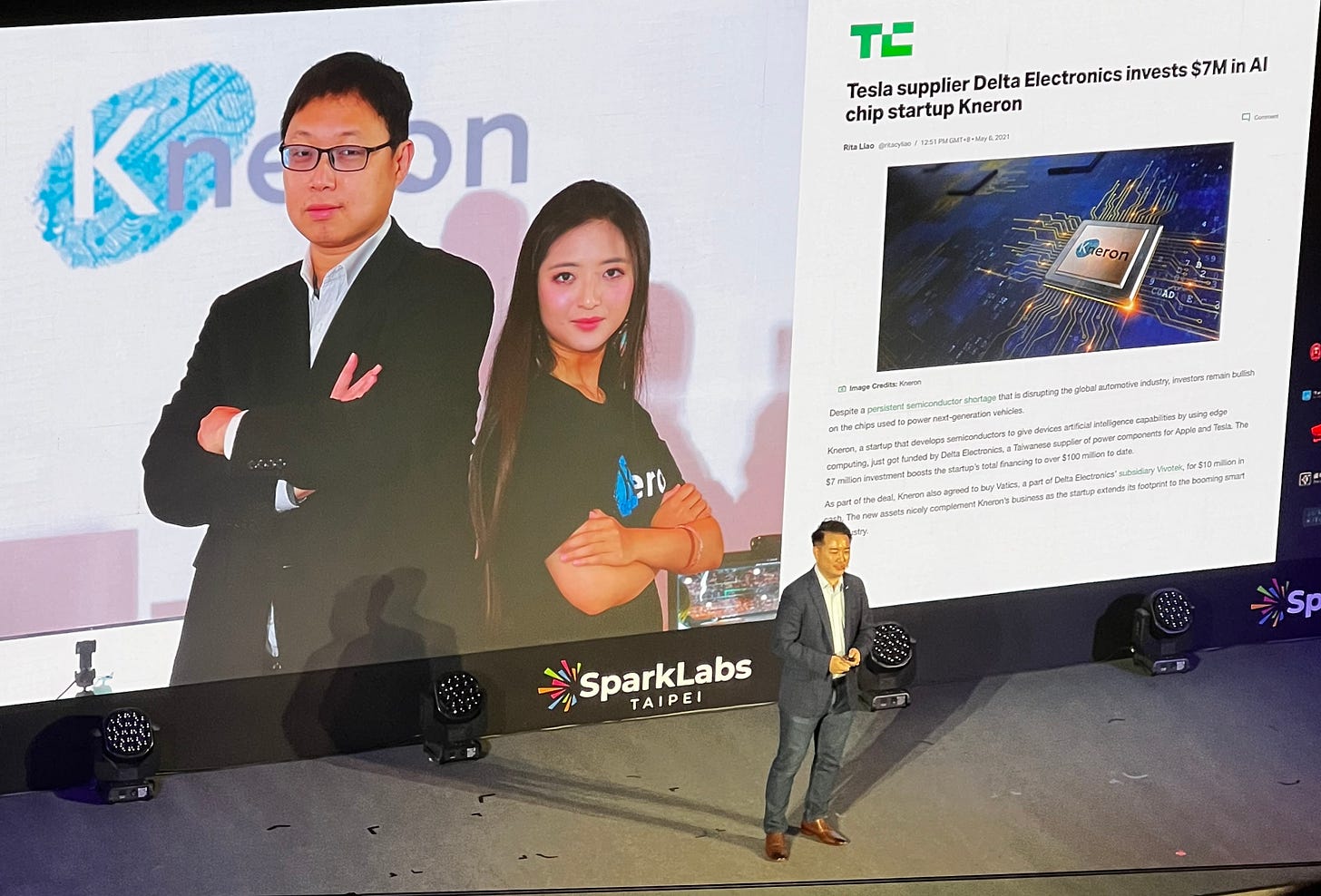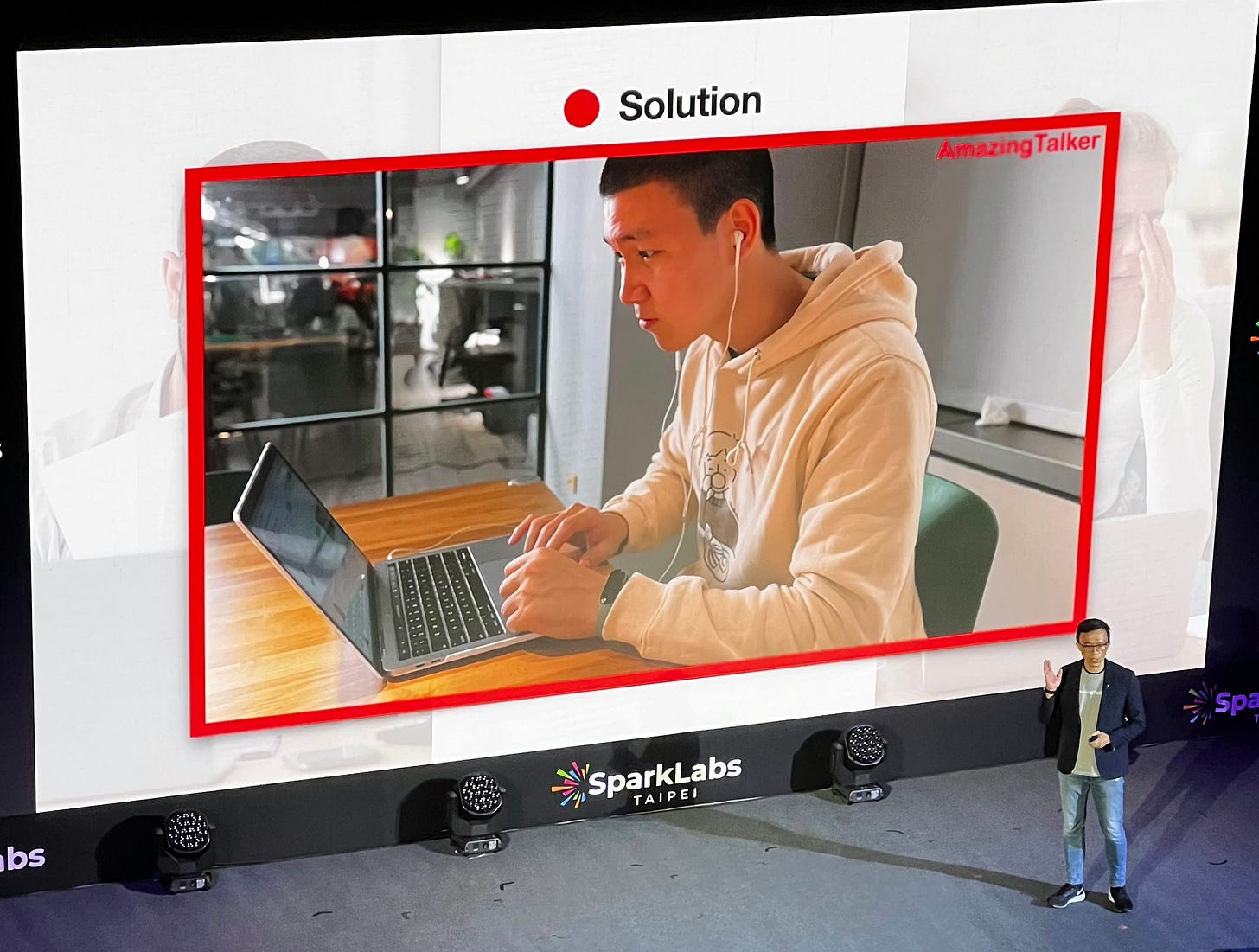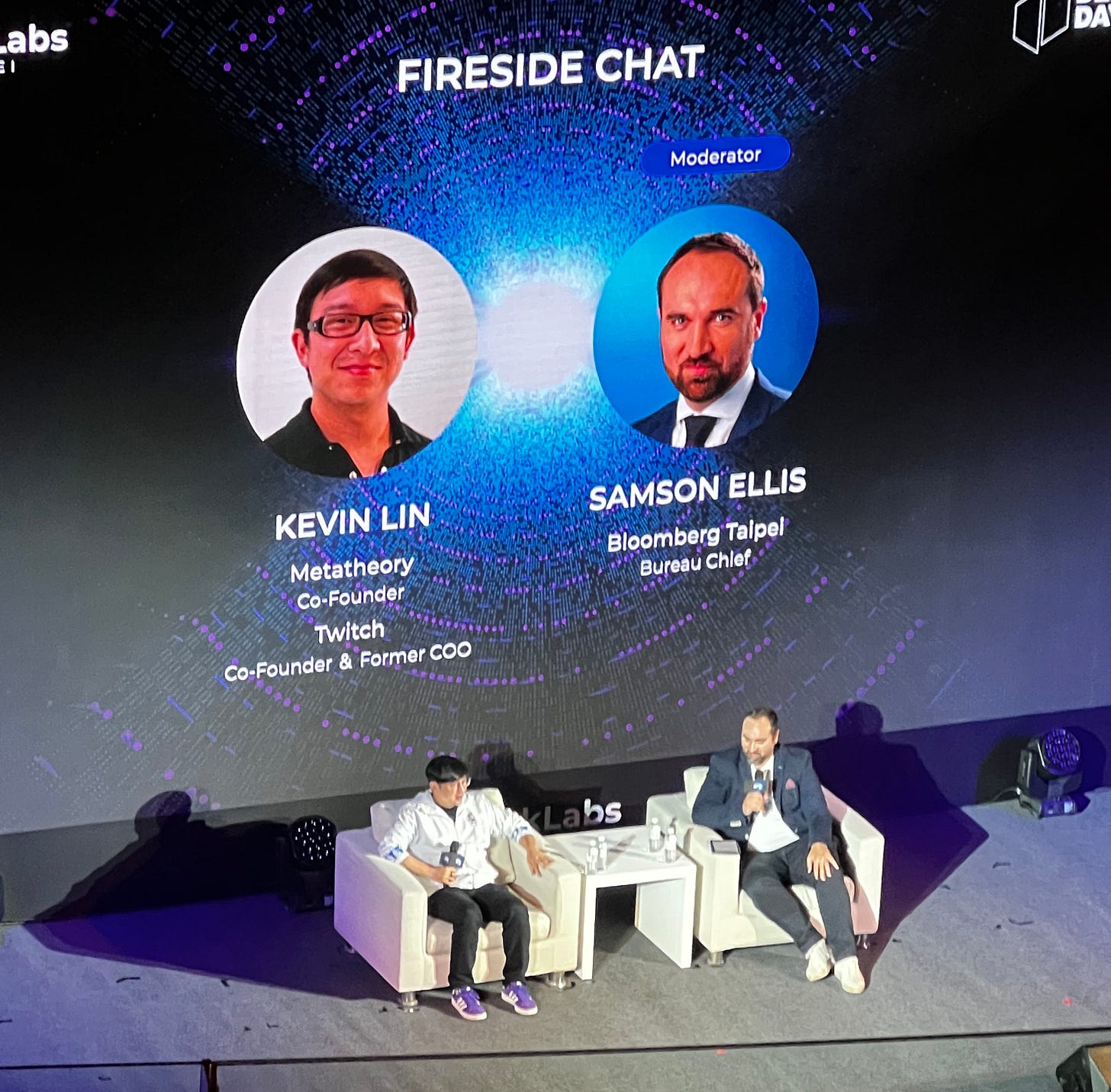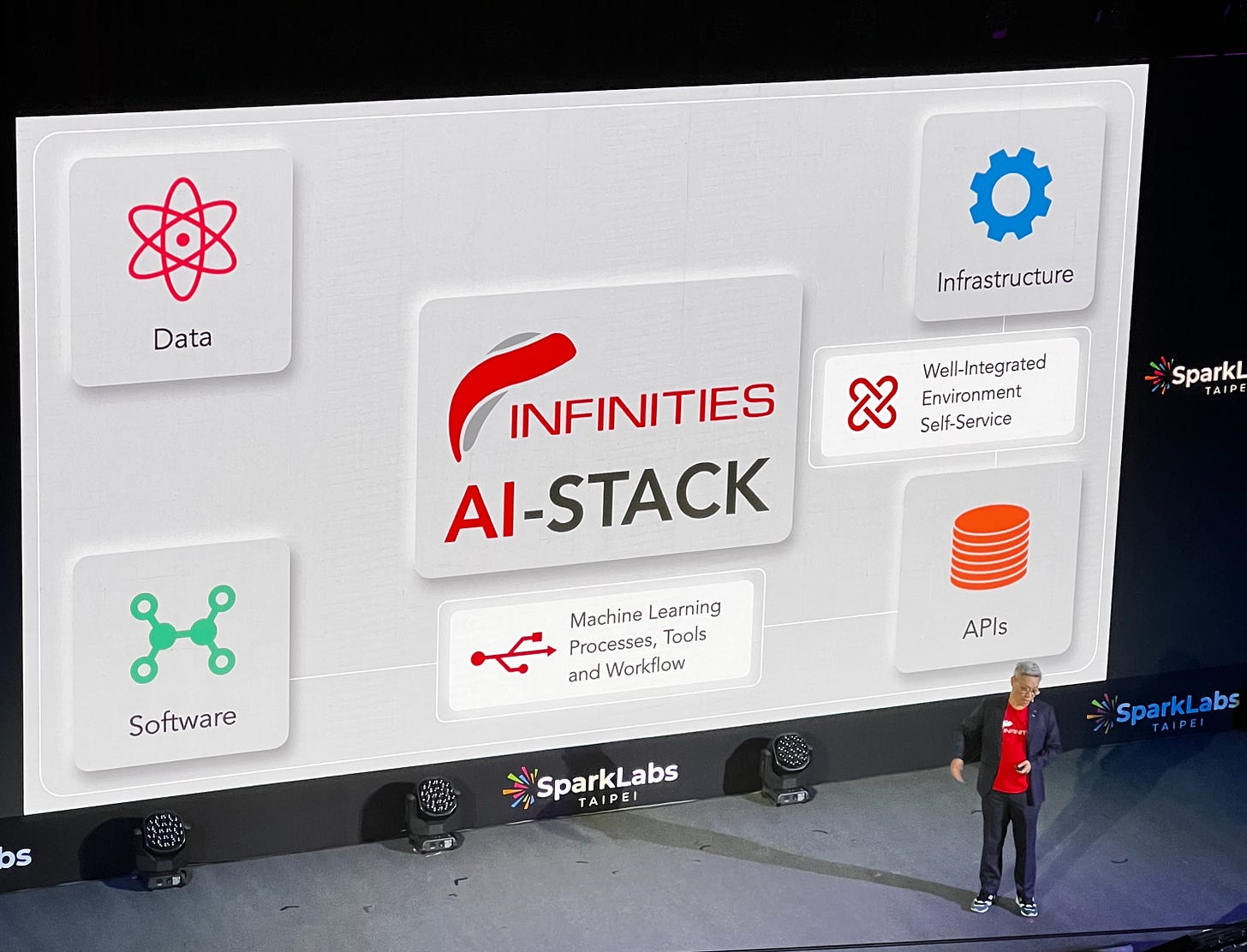On Funding, World-Class Taiwan startups, and Taiwanese Entrepreneurs
Thoughts from SparkLabs Taipei Demo Day 6
During my last trip to Meet Greater South, which I covered in the newsletter linked below, I was invited to attend the SparkLabs Taipei Demo Day.
I had seen co-founder and Managing Partner Edgar Chiu give a talk down in Kaohsiung and found his presentation to be the most impressive of all the ones I saw that day. The Taiwan startups they have funded were also quite impressive.
So I felt like it would be worth visiting the Demo Day for at least a little bit. At least pretend that I am still part of a tech community, right? So I signed up and attended last Thursday at the CPC Building in Xinyi.
If you want a pretty thorough breakdown, I recommend Meet Global’s writeup. It gives a concise overview of what happened. To this, I want to add a few things.
These are impressive startups
Edgar’s talks occasionally fall on the corny side. For instance, he likes to do these catchphrases like “Dream Big! Go Global!” and he shouted it at the end of his keynote at the show. He really sort of reminds me of your corny uncle at the family gatherings.
I reckon it is a Taiwan rah-rah, the-Boss-trying-to-be-just-one-of-the-guys sort of thing. I see this corniness in the office places of small and big companies alike. Considering the alternative tends to be the militaristic, at-all-costs style pioneered by companies like Foxconn, I am fine with it.
Beneath the corniness, however, I grasp what he is getting at: Export discipline. Companies that are able to compete on a global marketplace are valuable. Taiwan’s market is somewhat small. Companies that focus on the Taiwan market first are not suited to scale up to Western markets. Language and culture makes them more suited to go to China, but that market is becoming increasingly unfriendly.
Expanding into overseas Western markets helps sharpen these companies’ business models and tap growth. Being able to acquire funding from overseas VC funds shows that they are doing good on a global scale and aren’t just collecting investments because they are big fish in a small pond.
Obviously, the Demo Day chose the healthiest bunch of the litter to trot out for scrutiny. But the ones at the top really do seem to be world-class.
AmazingTalker was the headliner of the Demo Day event. Not just because they are first alphabetically but also because they do seem to be the most impressive Taiwan startup of the bunch. They have built a thriving marketplace business in the language tutor market, one of the most competitive spaces in Asia.
And I am impressed with their global expansion plans across Europe and Asia. If they pull it off - big “if” - then they will be a billion dollar company.
I have interacted with them before personally - an interaction which I can’t say was all that positive - but even that made it very clear to me that they take their work seriously. They run hard. I wish the working culture was a bit more healthy, but you don’t always win by being nice.
(Glassbox is also kind of cool too. I am really interested in more cost effective content creation. I do note however that this startup is invested in by SparkLabs but is based in the United States.)
Taiwan’s Startup Ecosystem Consistently Lacks One Thing
For a very long time, it has been clear what the Taiwan startup ecosystem is missing: Cheap funding. One of the most interesting things that Kevin Lin said at the fireside chat was that he felt that seed investors here in Taiwan took too much equity.
Investors would ask for something like 40-50% of the invested company - which is a really high number. Contrast this with the situation in the United States, where even a premier accelerator like Y-Combinator takes something like 7% in return for $125K. 40-50% is just too much. A few equity rounds and the founders no longer own their own company. If I was a founder, why deal with that noise?
I am not quite sure what to think of this situation. Taiwan is awash in savings and wealth. Taipei is one of the richest cities in the world - though not a lot of people might know it. With all that capital sloshing around, why not slice off a bit of that into risky startups? But I get the sense that most of this wealth is locked up in ultra-conservative hands - like the life insurers or 95-year-old grandpas who would rather invest their money in another luxury apartment in Taipei. Or TSMC.
I have been hearing this ever since 2016 when I first arrived here. The startup CEOs back then have been consistently saying the same thing: We can’t get funding for our companies unless we go abroad. I do think the attitude is slowly … slowly changing. SparkLabs Taipei seems to be on the more progressive side of venture capitalists, aiming to be the YC of Taiwan and Asia.
Side note: Jamie Lin of AppWorks is a particularly interesting case too. I have been thinking about his story for a while now, but had no occasion to talk about it. He founded AppWorks, which I think also wanted to be the YC of Taiwan. But then he became CEO of Taiwan Mobile, Taiwan’s second largest mobile network and subsidiary of Fubon Group - a $100 billion Taiwanese chaebol that nobody outside of Taiwan knows about.
Since then, Taiwan Mobile’s been doing a lot of interesting things in e-Commerce (their subsidiary Momo is either number 1 or 2 in Taiwan alongside Shopee) and also media (they produced a Netflix original TV show). I wonder if they’re aiming to be the Sea Group of Taiwan.
Taiwan is Still Working at AI. But Should It?
I have done videos before about artificial intelligence. In America, I don’t think anyone is talking about machine learning and AI all that much anymore. Feels like Web3 is the big tech catchphrase now.
But in Taiwan, AI is still a thing. One of the noticeable themes in a few of the pitches is that Taiwan’s domestic companies have yet to adopt it into their workflows. Thus, there are a number of Taiwan startups trying to fill that role as AI system integrator.
I have mixed feelings about this. In some ways, Taiwan is indeed quite backward. Companies run on lot of paperwork and old fashioned analog business practices like the use of the Company Seal or chop. It would be great if they can optimize using AI.
But at the same time, in order for a lot of AI projects to work out the right way you need to collect a lot of data. Which Taiwan companies aren’t exactly great at doing. Or do some really crazy custom stuff with the actual technology. This option is expensive.
I cannot help but recall SenseTime, China’s biggest AI system integrator. The company lost a stunning $583 million on $260 million revenue in the first half of 2021. If SenseTime with all their fancy PhDs and 996 can’t turn a profit, what is the future for these small AI startups?
The Two Types of Entrepreneurs
I suppose I should close this newsletter with some deep and insightful thought on the Taiwanese small business and investing landscape. I don’t have one. But here is something that has been turning around in my head for a while and I want to get it out.
I cannot speak much for the rest of the world, but what I have noticed in Taiwan is that Taiwanese are very entrepreneurial. But the companies they start are not very friendly with the Western model of venture capitalism.
When Taiwanese think of VC and tech startups, they are thinking of a pair of young guys or ladies posing in a slick office with their arms folded. The Silicon Valley type of business. And I am quite familiar with it too.
But most new, non-F&B (Food & Beverage) businesses in Taiwan are small 1-5 person shops founded by an experienced person - usually over 40. For instance, PanelSemi, the display company I met back at Meet Taipei, was founded by someone who worked at AU Optronics down in Tainan for many years. They get an idea after working many years in the industry, know exactly the need for it, and build a solution to meet the need.
You don’t even need a product. For instance, trading companies in Taiwan. Trading companies exist to help vet, connect, and grease the wheels of business in Taiwan. They are small companies - 7 employees at the most - founded by one or two people who know the industry. If someone wants to make and sell socks to the West, they meet the trading company first rather than the actual factory. The trading company helps set up the deal, arrange the little details, and set up logistics in exchange for a small commission.
I reckon that most of these small businesses are not that interested in growth or aren’t interested in VC money. They exist because someone wants to work on their own terms, can’t find another job in the industry, etc. They have a good chance of succeeding in the industry because of their experience and connections. But this makes them largely ineligible for venture capital funding - with the VC industry’s focus on hitting rare but big home runs.
Anyway, I genuinely do feel there will be a billion dollar Taiwan tech startup soon. If it isn’t AmazingTalker, then another. For instance, one of SparkLabs’ biggest portfolio companies never seems to participate in any of their events (their logo is in the picture above). But I think too much focus on Silicon Valley startups as the only way to do entrepreneurism in Taiwan misses a lot of the picture.




